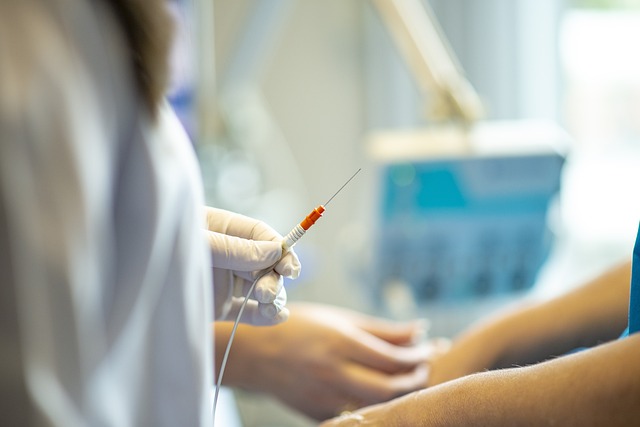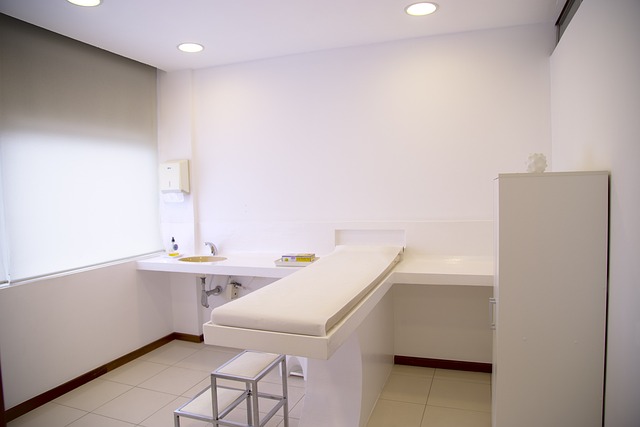Semaglutide is a groundbreaking medication that revolutionizes diabetes management by mimicking the body's natural GLP-1 hormone. It offers superior glycemic control, additional benefits like weight loss and reduced cardiovascular risks, and enhances quality of life through its dual action on insulin production and stomach emptying. For optimal results, semaglutide should be combined with:
Balanced diet: High in fiber from fruits, vegetables, whole grains, and lean proteins; low in carbohydrates with a focus on low-glycemic index foods.
Regular physical activity: From walking to strength training, incorporating intense workouts intensifies semaglutide’s insulin-sensitizing effects.
Stress management: Techniques like meditation, deep breathing, and yoga reduce stress hormones that negatively impact blood sugar control.
Quality sleep: Semaglutide positively impacts sleep patterns, so prioritizing quality rest alongside treatment is vital for glycemic stability.
* Hydration: Adequate water intake is crucial for optimal glycemic control, kidney function, and overall health while taking semaglutide.
Continuous monitoring of blood sugar levels, meals, physical activity, and medication dosing, in consultation with a healthcare provider, allows for adjustments to the treatment plan and ensures the best possible outcomes for individuals living with type 2 diabetes.
“Discover how semaglutide, a revolutionary diabetes treatment, transforms lives through lifestyle adjustments. This comprehensive guide explores the science behind semaglutide’s blood sugar regulation and its synergistic relationship with dietary choices, exercise, stress management, sleep, hydration, and monitoring. Learn practical tips to optimize your health journey, making the most of semaglutide’s potential as a game-changer in diabetes management.”
Understanding Semaglutide: A Diabetes Game Changer

Semaglutide has emerged as a game-changer in diabetes treatment, offering a novel approach to blood sugar management. This medication, an analog of the natural hormone GLP-1, mimics the body’s natural response to regulate insulin and glucose levels. By stimulating insulin production and slowing gastric emptying, semaglutide helps individuals with type 2 diabetes achieve better glycemic control.
Its effectiveness has been demonstrated in numerous clinical trials, showing significant improvements in HbA1c levels compared to placebo or other treatments. Moreover, semaglutide’s benefits extend beyond blood sugar regulation. It can lead to weight loss, reduce the risk of cardiovascular events, and improve overall quality of life for patients with diabetes—making it a promising and much-anticipated option in the management of this chronic condition.
How Semaglutide Works in Regulating Blood Sugar

Semaglutide, a groundbreaking medication in the diabetes treatment landscape, works by mimicking the effects of a natural hormone called GLP-1 (glucagon-like peptide-1). This hormone is secreted in response to food intake and plays a crucial role in regulating blood sugar levels. By activating GLP-1 receptors, semaglutide stimulates insulin secretion when blood sugar is high, helping to lower glucose levels.
Furthermore, it slows down the emptying of the stomach, leading to increased feelings of fullness and reduced appetite. This dual action not only aids in managing blood sugar but also supports weight loss, making it a versatile tool in diabetes management. Its unique mechanism makes semaglutide an effective and innovative solution for those living with type 2 diabetes, offering a more controlled and balanced approach to blood sugar regulation.
Lifestyle Adjustments: The Companion to Semaglutide Therapy

Semaglutide, a groundbreaking medication in the diabetes treatment landscape, isn’t just about pills or injections; it’s a partnership with lifestyle adjustments. For optimal results, patients must embrace changes that complement semaglutide’s effects on blood sugar levels. This includes adopting a balanced diet, rich in fiber and lean proteins, which can enhance insulin sensitivity and further regulate glucose.
Regular physical activity is another key component. Incorporating at least 150 minutes of moderate aerobic exercise or 75 minutes of vigorous activity weekly can significantly improve metabolic health. Combined with semaglutide, these lifestyle changes create a powerful synergy, helping to achieve and maintain better blood sugar control, weight management, and overall well-being for individuals with diabetes.
Diet and Nutrition: Fueling Your Body with Semaglutide

When using semaglutide for diabetes treatment, diet and nutrition play a crucial role in managing your condition effectively. This medication works by mimicking a natural hormone that regulates appetite, helping you feel fuller for longer periods. As a result, it’s essential to focus on a balanced diet that supports weight management and overall health. Aim for whole foods rich in fiber, such as fruits, vegetables, whole grains, and lean proteins, which can help stabilize blood sugar levels.
Incorporating healthy eating habits alongside semaglutide therapy can enhance its benefits. Reducing carbohydrate intake and focusing on low-glycemic index foods can further assist in controlling blood sugar spikes. Additionally, staying hydrated by drinking plenty of water is vital. Remember, proper diet and nutrition are a game-changer in managing diabetes, complementing the positive effects of semaglutide treatment.
Exercise as a Tool for Optimal Results with Semaglutide

Exercise plays a pivotal role in enhancing the efficacy of semaglutide, a groundbreaking diabetes treatment. For individuals managing diabetes with this medication, incorporating regular physical activity into their routine can lead to significant improvements in blood sugar control. The key lies in finding a balance—combining semaglutide’s metabolic effects with exercise to achieve optimal results.
Whether it’s brisk walking, cycling, or strength training, the type of exercise is less crucial than consistency and intensity. Semaglutide’s ability to lower blood sugar can be amplified by the insulin-sensitizing effects of exercise, creating a powerful synergy. Healthcare professionals should guide patients on how to tailor their workout routines, emphasizing the importance of staying active throughout the day.
Mindful Stress Management: A Crucial Aspect of Diabetes Control

Mindful stress management plays a pivotal role in effective semaglutide diabetes treatment. Diabetes can be a stressful condition to manage, and high stress levels can negatively impact blood sugar control. By incorporating mindfulness techniques such as meditation, deep breathing exercises, and yoga, patients using semaglutide can reduce stress hormones that contribute to elevated blood glucose. These practices promote relaxation and improve overall well-being, allowing individuals to better adhere to their diabetes management plan.
Additionally, mindful stress management supports healthier lifestyle choices, including improved sleep habits and enhanced nutrition awareness. All these factors work synergistically with semaglutide therapy to optimize blood sugar control. By addressing stress head-on, patients can experience better glycemic stability, reduced risk of complications, and an improved quality of life.
Quality Sleep and Semaglutide: Unlocking Restorative Benefits

Quality sleep is a critical component of overall health, and for individuals managing diabetes with semaglutide, it can unlock restorative benefits that support better blood sugar control. Semaglutide diabetes treatment not only aids in weight management and reducing hunger but also has a positive impact on sleep patterns. Research suggests that by regulating hormones that influence appetite and glucose metabolism, semaglutide can help alleviate insomnia and promote deeper, more restful sleep.
A good night’s rest is essential for the body to effectively utilize insulin, regulate blood sugar levels, and restore energy reserves. When taken consistently, semaglutide can contribute to a more stable circadian rhythm, leading to improved sleep quality. This, in turn, supports better diabetes management by enhancing the body’s natural ability to metabolize glucose efficiently. By prioritizing quality sleep alongside semaglutide therapy, patients can maximize the benefits of their diabetes treatment and enjoy overall well-being.
Staying Hydrated: An Often Overlooked Factor in Diabetes Management

Staying hydrated is a crucial yet often overlooked aspect of managing diabetes, especially when undergoing semaglutide diabetes treatment. Semaglutide, as part of its mechanism of action, can influence blood sugar levels and appetite, which may lead to changes in fluid intake and overall hydration status. It’s essential for patients to understand that adequate water consumption is vital for optimal glycemic control and overall health. By staying well-hydrated, individuals on semaglutide therapy can ensure their bodies function efficiently, aiding in the absorption of medications and facilitating kidney function, which plays a critical role in glucose elimination.
Diabetic patients should aim to drink enough water throughout the day, even if they don’t feel thirsty, to maintain proper hydration levels. The amount needed may vary based on individual factors such as activity level, climate, and overall health status. Incorporating regular water breaks during meals and between activities can help establish a healthy hydration routine. Additionally, patients should be mindful of their fluid intake from other sources, including foods with high water content, to ensure they meet their daily hydration goals.
Monitoring and Adjusting: Your Journey with Semaglutide

Monitoring and adjusting your lifestyle alongside semaglutide diabetes treatment is a key aspect of your journey to better health. As you begin, regularly track your blood sugar levels, meals, physical activity, and medication dosing. This data will empower you to recognize patterns and make informed decisions about your routine. For instance, understanding how certain foods or exercises impact your blood sugar can help you fine-tune your diet and exercise plan.
Over time, your healthcare team may need to adjust your semaglutide dosage based on these observations. Regular communication with your doctor is vital to ensure the treatment plan remains optimal for your needs. They will guide you in interpreting the changes and offer personalized advice to keep you on track, ultimately helping you achieve and maintain stable blood sugar levels through this innovative semaglutide diabetes treatment.
